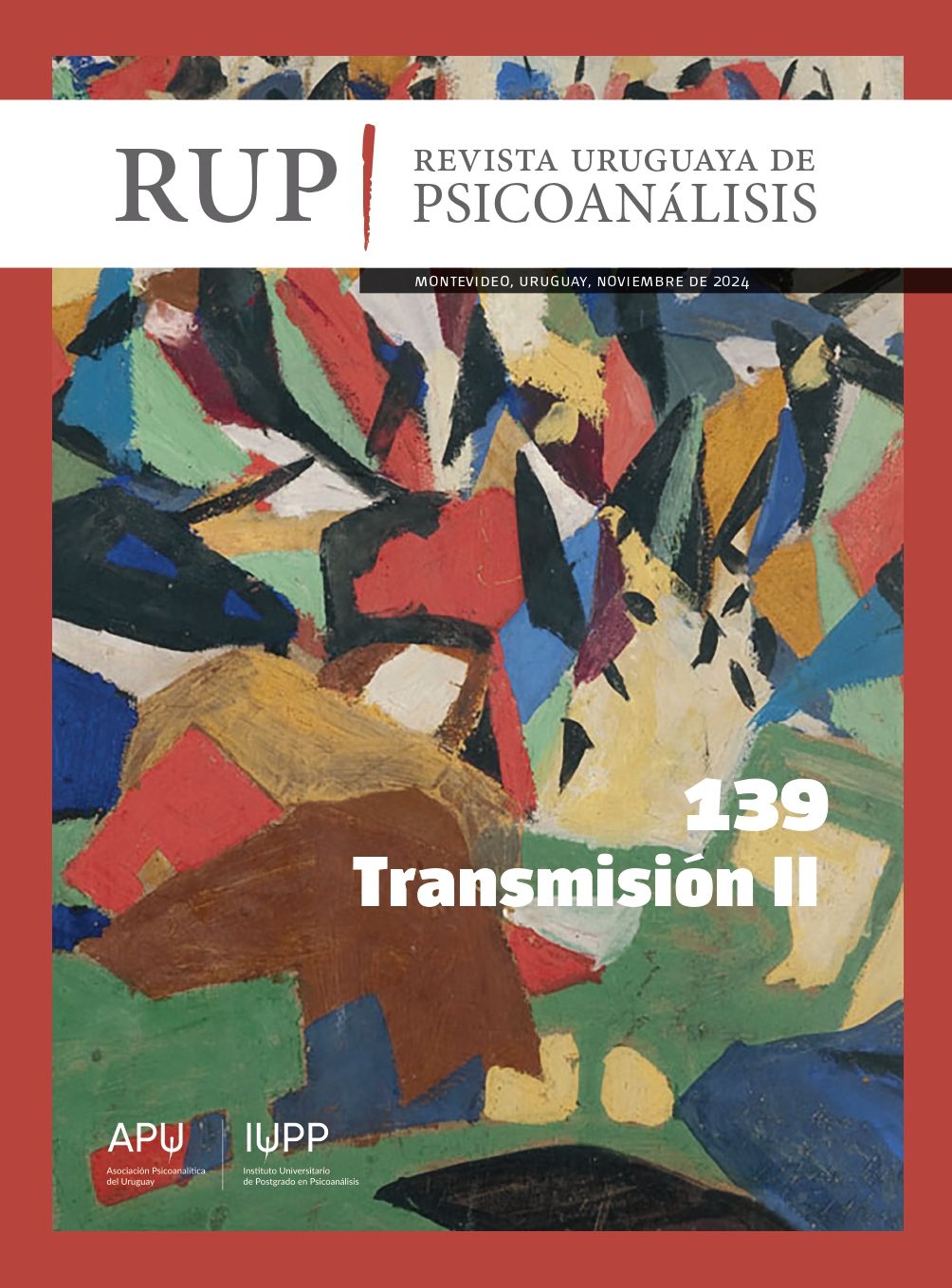Transmission-reception and the personal use of different psychoanalytic theories during psychoanalytic training
DOI:
https://doi.org/10.36496/n139.a1Keywords:
psychoanalytic training / research / clinic / theory / pluralism, transmissionAbstract
This paper studied the effects of pluralism in psychoanalytic training in a group of psychoanalysts who had completed their training at the Institute of the Psychoanalytic Association of Uruguay (APU) in 2005. The process of transmission and reception of ideas and their use in practice was studied in clinical materials submitted for approval of the Supervision, the Master's Thesis and in indepth interviews recorded with the participants. In data analysis, a qualitative methodology was used, taking into account ethical requirements, especially confidentiality. The study was carried out in two stages between 2005 and 2010, and between 2012 and 2018. T he results obtained allowed us to describe some characteristics of the psychoanalytic ideas used by the group studied and different inferential processes in the theoretical-clinical articulation: the illustrative, the evocative and the critical. The potentialities and risks of these different process are discussed. The study showed that all the analysts used different theoretical approaches in their practice and ideas during their training at the AP institute, taking into account the pluralistic context of the training. Finally, the results obtained are discussed, considering the limits of this research and leaving open questions regarding the characteristics of psychoanalytic training at the present time and in the future.
Downloads
References
Altmann, M. y Corti, A. (2004-2005). La formación analítica y la actividad profesional en América Latina. (Inédito).
Bernardi, R., Altmann, M., Cavagnaro, S., León, B. de, Barbieri, A. M. de, Garbarino, A., Flores, M., Frioni, M., Lamonaca, J., Morato, R., Seigal, J., Schroeder, D., Tellería, E. y Pokorny, D. (1997). Cambios de la interpretación entre 1960 y 1990 en el psicoanálisis uruguayo. Revista Uruguaya de Psicoanálisis, 84-85, 89-102.
Bleger, J. (1969). Teoría y práctica en psicoanálisis: La praxis psicoanalítica. Revista Uruguaya de Psicoanálisis, 11, 287-303.
Charmaz, K. (2000). Grounded theory: Objectivist and constructivist methods. En N. Denzin y Y. Lincoln (ed.), Handbook of qualitative research (vol. 2, pp. 509-536). Sage.
Grau-Pérez, G. (2024). Sobre el caso clínico en psicoanálisis: Una respuesta a Guy Le Gaufey. Revista Uruguaya de Psicoanálisis, 138, 50-71.
Leibovich de Duarte, A. (2000). Más allá de la información dada: Cómo construimos nuestras hipótesis clínicas. Revista de La Sociedad Argentina de Psicoanálisis, 3, 97-114.
León de Bernardi, B. de (2010). La formación psicoanalítica en un contexto de pluralismo teórico y técnico. Revista Latinoamericana de Psicoanálisis, 9, 119-138.
León de Bernardi, B. de (2019). Efectos del pluralismo teórico en la formación y práctica psicoanalítica [tesis de doctorado]. Universidad de Buenos Aires.
León de Bernardi, B. de (2023). Field theory: The transference-countertransference relationship and second look. The International Journal of Psychoanalysis, 104(4), 737-754.
Levitt, H. M. (2021). Qualitative generalization, not to the population but to the phenomenon: Reconceptualizing variation in qualitative research. Qualitative Psychology, 8(1), 95-110.
Pichon-Rivière, E. (1998). El proceso grupal: Del psicoanálisis a la psicología social. Nueva Visión. (Trabajo original publicado en 1975).
Pierce, C. S. (1965). Collected papers of Charles Sanders Peirce. The Balknap. Razonamiento abductivo (1 de octubre de 2024). Wikipedia. https://es.wikipedia.org/w/index. php?title=Razonamiento_abductivo&direction= next&oldid=160769626
Rodríguez Quiroga de Pereira, A. M., Ragau, M. R., De Weinstein, L. V. y Jadur, S. G. (2007). Authors who have an impact on candidates’ training: Cultural differences and theoretical languages. The International Journal of Psychoanalysis, 88, 1245-1261.
Sandler, J. (1983). Reflections on some relations between psychoanalytic concepts and psychoanalytic practice. The International Journal of Psychoanalysis, 64, 35-45.
Schroeder, D., Tellería, E. y Gratadoux (2005). Revisión Plan de Estudios: Estudio de las propuestas docentes entre los años 2000 y 2005. Material de circulación interna de la Asociación Psicoanalítica del Uruguay.
Zukerfeld, R. y Zonis Zukerfeld, R. (2013). El problema del autor en la formación psicoanalítica: Procustianismo, pluralismo riguroso e iconoclastia respetuosa. Aperturas Psicoanalíticas, 45. http://www.aperturas.org/ articulos.php?id=0000825
Downloads
Published
Issue
Section
License
Copyright (c) 2024 Revista Uruguaya de Psicoanálisis

This work is licensed under a Creative Commons Attribution 4.0 International License.


 This work is licensed under a
This work is licensed under a 